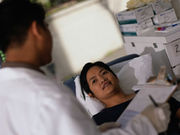Bilingual/bicultural lay health educator education can increase screening among Hmong-Americans
FRIDAY, Sept. 2, 2016 (HealthDay News) — An intervention involving bilingual/bicultural lay health educator (LHE) education can increase colorectal cancer (CRC) screening among Hmong-Americans, according to a study published online Aug. 26 in Cancer.
Elisa K. Tong, M.D., from the University of California at Davis, and colleagues conducted a randomized trial involving 329 Hmong-Americans in Sacramento. Participants were foreign-born, with mostly no formal education, limited English proficiency, and no employment. They were randomized to either an intervention group, which received CRC education over three months delivered by an LHE, or to a control group, which received education regarding nutrition and physical activity.
The researchers found that after the intervention there were greater changes for ever-screening (P = 0.068) and being up-to-date with screening (P < 0.0001) for the intervention group versus the control group. In multivariate regression analysis, the intervention group showed a greater increase than the control group in reporting ever-screening and being up-to-date with screening (adjusted odds ratios, 1.73 and 1.71, respectively). The odds of receiving screening, both ever-screening and up-to-date screening, were increased more than four-fold for individuals with health insurance. For both screening outcomes, a higher CRC knowledge score mediated the intervention effect.
“A culturally and linguistically appropriate educational intervention delivered by trained LHEs was found to increase CRC screening in an immigrant population with low levels of education, employment, English proficiency, and literacy,” the authors write.
Copyright © 2016 HealthDay. All rights reserved.








